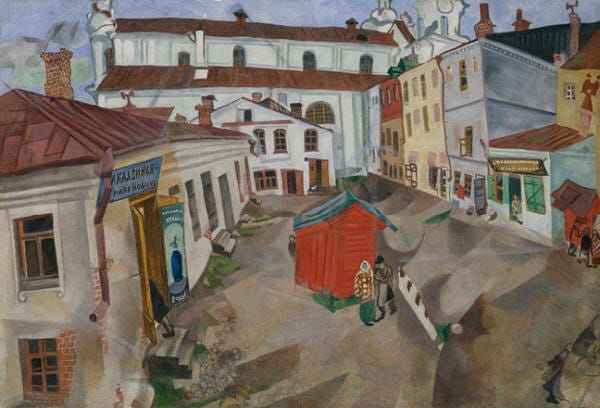Morning and Evening, Pt. VIII
The eighth installment in an ongoing narrative, told week by week
Previously published: Morning and Evening, Parts I, II, III, IV, V, VI and VII
A drop of wax landing painfully on his knuckles jolted Yossel from this reverie, and he turned back to the text before him, though the plea remained within him: Reb Ashi Reb Shmuel Akiba and Gamliel—all you martyrs bloodied by the Roman sword—am I not too a creature of my God? Is His breath not in my nostrils, as in the nostrils of the first man?
When, at long last, in the cold wind that howled down from the clifftops, he was let out of the heder and into the street, he felt weariness grip his shoulders, and his head drooped towards the broad collar of his greatcoat. All day the rain had gone on in fits and starts; the other boys, hurrying home, left footprints hollowed in the muck, and the cold water pooled blue-black in their tracks. The usual traffic of market-wives and farmers had stayed in against the scything of the rain, and the path downhill from Schoenbrun’s was deserted. Again, as he had done so many times before, he began the descent downward into the town square; the white façade of the church loomed high above the low wood houses, its stair swept utterly clean by the rain, and empty of their sole occupant. Yossel’s breath rose before him in a white bloom of vapor. In the wake of the rain the town square was still, a low bowl cupped against the surrounding hills and filled with a dense press of fog.
Yossel moved through the empty square, savoring the rare stillness of the hour, the silence of tamped chimneys and shuttered store windows. He sat on the damp stair of the church and the cool drops gathered on the ledge slicked his trousers, dispelled the final remnants of the heder’s heavy gloom. Around him the poplars and elms that overlooked the shops were already bare and black; only a few scarred pines showed their densely furred green heads against the gathering skies, and the sharp clear light made each needle seem bitterly pointed as a blade. His sleepy languor dissipated entirely as he sat on the cold stone; against the hills that surrounded Hanachiv like a retaining wall of sloped and guttered rock, a heavy bank of cloud was gathering at the hocks, poised to spring.
All at once a rush of anger, stippled throughout with sorrow, clutched at his weary, intemperate heart. How many mornings had he clenched his tongue between two fingers, trying to shake the stammer out of it, pinching until it bled, painfully, filling his cheeks? And all to no avail; when he read aloud the speech he was to make to the congregation, the one that must show all of Hanachiv and the surrounding towns his genius—must make clear the need to send him forth to a yeshiva in a far town with high arches and a Torah bedecked in crimson skirts—the words crowded at his teeth and refused to move beyond them, emerging in fits, in jagged bleats, like the senseless mewlings of a sickly lamb. In vain would his mother buy spiced wine and honey-cakes from the market stalls, in vain had she spared him labors as an apprentice, in vain, in service of a mute, reluctant heart, had she woken in the morning and wept in the evening.
And then into the dark thickets of his mournful thoughts the white limbs of Hinda, the bare torso of Pawel against the flowering cliff, came plunging like white hinds, clearing a path before them. Against them even his sorrow had no power, and the heavy sky lightened to his eyes, such was the force of his wantonness, the sweet, melancholy, irresistible desire that coursed through the small body of the boy on the church steps, under the black brows of the hills.
Keep reading with a 7-day free trial
Subscribe to The Sword and the Sandwich to keep reading this post and get 7 days of free access to the full post archives.




